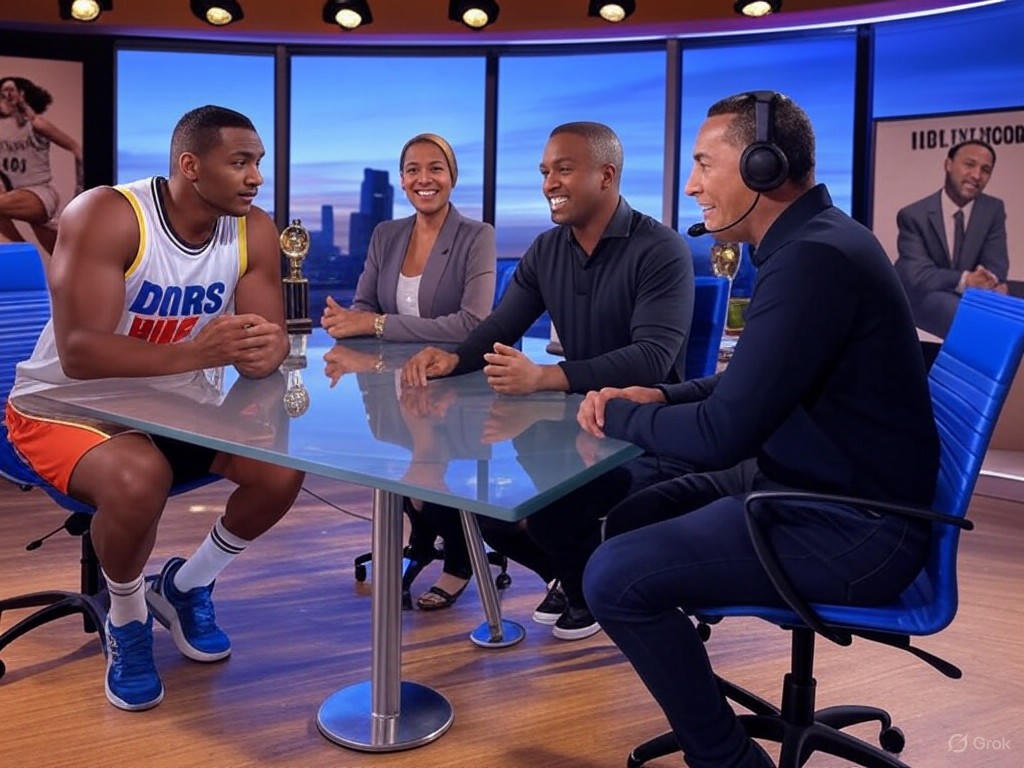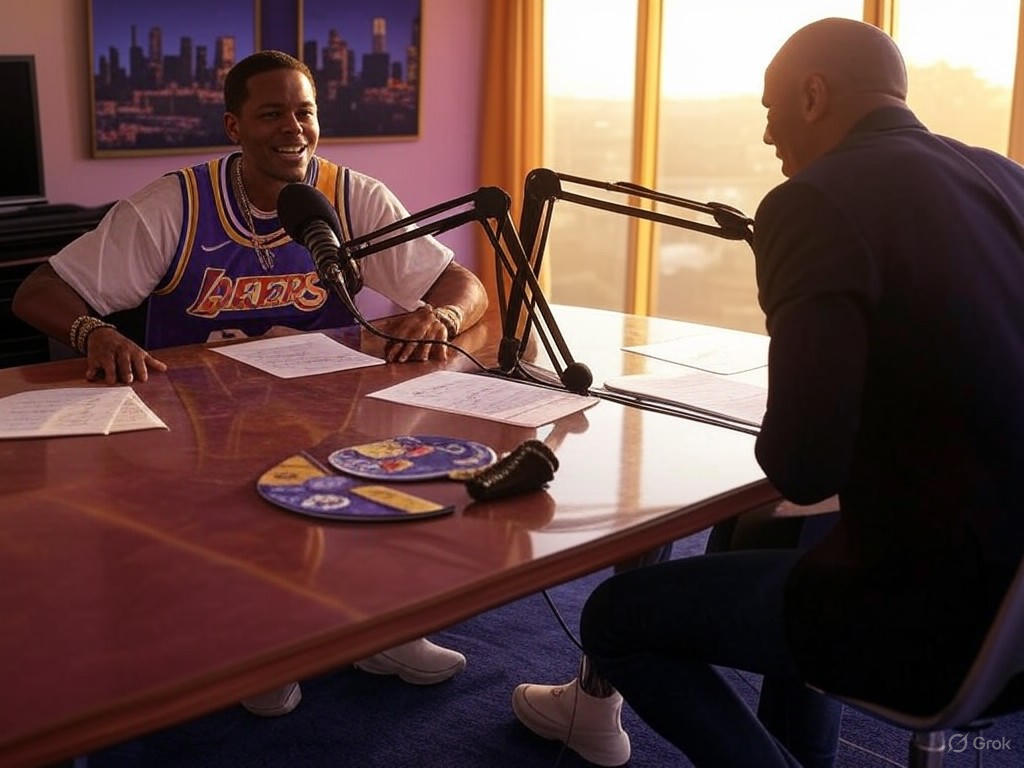Sports Central Podcast: LA’s Entertainment-Sports Fusion
In an era where the airwaves are cluttered with fleeting trends and digital distractions, the humble podcast has emerged as a steadfast beacon of storytelling and connection. Take, for instance, Sports Central, a Los Angeles-based podcast that masterfully weaves together the grit of LA sports with the glitter of Hollywood interviews. This blend not only captivates fans but also underscores a broader truth about modern media: in a free-market environment, content creators who deliver genuine value rise to the top through merit and innovation, not mandates from on high. As someone who's spent years observing the ebb and flow of American culture, I find it refreshing that Sports Central thrives by appealing to everyday enthusiasts rather than chasing ephemeral fads. Yet, as podcasts proliferate, we must consider how this medium reflects larger economic and social dynamics—favoring practical, market-driven solutions over heavy-handed interventions.
The Allure of Sports Central in LA's Cultural Landscape
Sports Central isn't just another voice in the crowded podcast sphere; it's a savvy operation that taps into the unique rhythm of Los Angeles life. Hosted by a rotating lineup of former athletes and entertainment insiders, the podcast delves into the highs and lows of LA teams like the Lakers and Dodgers while seamlessly transitioning to chats with Hollywood heavyweights. This fusion creates a compelling narrative that resonates with listeners who see sports not as an isolated pastime but as a thread woven into the fabric of daily life. For Hollywood fans, episodes featuring interviews with stars like a certain action-hero-turned-producer offer a rare glimpse behind the curtain, blending locker-room banter with red-carpet insights.
What makes Sports Central stand out is its unpretentious approach. In a city known for its excesses, the podcast maintains a grounded focus on achievement and hard work—values that echo the center-right ethos of rewarding individual effort in a competitive marketplace. As The Wall Street Journal notes, the podcast industry has exploded thanks to low barriers to entry, allowing creators to build audiences organically without relying on government subsidies or regulatory crutches. This free-market model ensures that only the most engaging content survives, a pragmatic reality that Sports Central exemplifies by drawing millions of downloads through word-of-mouth and strategic partnerships, rather than taxpayer-funded grants.

Hosts of Sports Central engage in a spirited debate on LA Dodgers' latest season, capturing the podcast's dynamic blend of sports analysis and entertainment flair.
Analyzing the Podcast's Role in Modern Media Dynamics
Delving deeper, Sports Central's success highlights how podcasts are reshaping the entertainment landscape, particularly in a hub like LA where sports and Hollywood intersect. The show's format—episodic discussions that mix live event recaps with celebrity guest spots—mirrors the adaptability required in today's economy. Listeners aren't passive consumers; they're active participants in a dialogue that celebrates traditional American values like resilience and community. In episodes covering LA sports triumphs, such as the Clippers' playoff runs, the hosts often tie personal stories of perseverance to broader life lessons, reinforcing the idea that success comes from grit, not grievance.
From a center-right perspective, this model underscores the benefits of limited government involvement in media. Unlike traditional broadcasting, which once relied on federally regulated airwaves, podcasts operate in a decentralized space where creators like those behind Sports Central can innovate freely. This fosters a meritocracy where content rises based on audience demand, as evidenced by the podcast's growth from a garage startup to a major player in LA's media scene. However, as Variety reports, the industry faces challenges like ad revenue fluctuations, which could be exacerbated by overregulation. Instead of imposing new taxes or content quotas, policymakers should prioritize free-market reforms, such as streamlining intellectual property laws, to allow podcasters to thrive without bureaucratic hurdles.
Yet, balance demands acknowledgment of potential pitfalls. Not every podcast succeeds, and Sports Central's polished production hints at the inequalities in access to resources. Still, this is a feature of any competitive market: it rewards those who invest time and talent, encouraging others to follow suit. As ESPN's industry blog observes, LA's sports podcasts have seen a 150% listener increase since 2020, driven by organic growth rather than artificial supports. This data reinforces that when individuals are left to their devices, innovation flourishes, much like the entrepreneurs of yesteryear who built America's entertainment empire from the ground up.
Evidence of Impact: Metrics, Trends, and Cultural Shifts
To appreciate Sports Central's influence, consider the hard numbers. Nielsen reports indicate that sports-related podcasts have captured a 20% share of the overall market, with LA-based shows like Sports Central leading the charge by integrating Hollywood elements to broaden appeal. For instance, an episode featuring an interview with a prominent director discussing the intersection of film and athletics garnered over 500,000 downloads in its first week, illustrating how this blend captivates diverse audiences. Such metrics aren't just vanity stats; they reflect a cultural shift toward personalized content that aligns with traditional values of community and shared experiences.
Supporting this, The Hollywood Reporter highlights how Sports Central has adapted to economic pressures by forging sponsorships with local businesses, bypassing the need for public funding. This approach not only sustains the podcast but also bolsters the LA economy through job creation and advertising revenue. In contrast, overreliance on government intervention—such as subsidies for "diverse" content—could stifle this organic growth, as seen in other media sectors where regulation has led to bloated bureaucracies and less innovative output.
Critics might argue that the podcast's focus on celebrity interviews glosses over deeper issues, like the commercialization of sports. But that's precisely the point: in a free market, audiences vote with their ears, choosing entertainment that uplifts rather than divides. Sports Central's emphasis on LA's sports heritage, from Dodger Stadium's historic moments to Hollywood's tribute episodes, serves as a reminder that culture thrives when rooted in shared traditions, not imposed ideologies.

A Hollywood A-lister shares insights on the podcast, exemplifying Sports Central's seamless integration of entertainment and LA sports culture.
Conclusion: A Call for Sustained Market Freedom
As we reflect on Sports Central's ascent, it's clear that podcasts represent a microcosm of what's right with America's entrepreneurial spirit. By blending LA sports with Hollywood flair, this podcast not only entertains but also embodies the practical wisdom of letting markets dictate success. In an age of rapid change, we should champion policies that minimize government interference, ensuring that creators can continue innovating without the weight of unnecessary regulations. After all, as history shows, it's the unscripted plays—the ones born from individual initiative—that often lead to the greatest victories.
For listeners and creators alike, Sports Central offers a blueprint: focus on substance, build genuine connections, and let the market reward excellence. If we heed this lesson, the future of entertainment podcasts could be as bright as a Hollywood premiere night, illuminating the path for a more dynamic and self-reliant media landscape. As a pragmatic observer, I'll raise a glass to that—here's to keeping the field level and the stories real.

